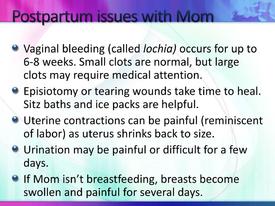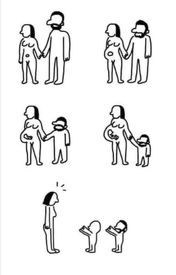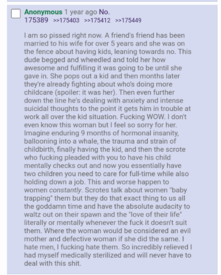images.jpeg-123.jp…

Anonymous 223075
not sure if its a bigger red flag a man wanting kids or not wanting them.
thoughts?
Anonymous 223078
natalist moid:
>indifferent to cruelty
>self-satisfied
>profoundly underestimates human care requirements, callous
>morality of triviality and tradition
antinatalist moid:
>hyperdefensive, hypersensitive
>will shooting spree
>follows a vtuber (maybe "ironically")
>morality of autistic memes
Anonymous 223080
tumblr_94b37b03795…

>>223075neither. all moids are walking redflags. Your best luck is trying to check the hows and whys of their belief and see if they're being retarded about it or not.
Anonymous 223081
>>223079People who believes in growing the population
Anonymous 223084
>>223080This.
A lot of moids just want to spread their seeds and not care for the kid. It's why so many men dip on the responsibility of being the father.
The ones who dont want kids usually understand that they are not fit to be a parent to being with.
Anonymous 223088
>>223080>neither>all moids are walking redflagsThen its both, not neither.
Anonymous 223089
>>223088yeah. but you get what I tried to say
Anonymous 223094
If he tells you he doesn't want kids with you he is letting you know he doesn't want to marry you.
Anonymous 223116
>>223075The green flag is that he will support you in whichever you prefer
Anonymous 223118
>>223116The only correct answer.
You shouldn't stay together if you don't have mutual feelings about serious life commitments. It can lead to someone feeling dissatisfied in the relationship and in life. Like if he doesn't want to have kids when you really want to.
I'm fortunate enough that my husband, feels the same way about not having kids.
Anonymous 223130
Don't think someone wanting kids makes them a "natalist" in a political sense necessarily. Like my bf grew up raising his younger siblings cuz his mom was always working and has helped raise his nephews and just thinks kids are fun and funny and that it's rewarding to nurture them and watch them grow up. Kind of the opposite of a red flag for me bc seeing how good he is with babies (and baby animals) makes me feel safer and less scared of him than I am of most men I guess.
Anonymous 223137
>>223130>Don't think someone wanting kids makes them a "natalist" in a political sense necessarily.It's an ethical category, not a political one. It generally only enters political discourse in the context of religion, due to the ties between religion and ethical philosophy. Though it does sometimes enter into politics without clear religious ties as Stalin was an abortion-banning natalist despite his firm atheism.
>and that it's rewarding to nurture them and watch them grow up.He's a natalist then, and the unconscious and ill considered kind whose natalism is a form of self-gratification without consideration for the true responsibility of bringing life into existence.
Try to consider the weight of responsibility for a life that brings more harm than joy to the world.
Almost 20% of moids are rapists, and according to increasingly alarming figures it is possible that nearly 30% are adult virgins. These were also children once brought into the world for the gratification of their parents, whether merely impulsively sexual and without consideration beyond that, or worse for the gratification of parental instincts, social preening or narcissistic reinforcement. They clearly should not have been allowed to exist, as the harm that they cause to society overall greatly outweighs the small period of time in which they brought joy to one or possibly two parents' lives. That is at least and at minimum 50% odds that a male life will be a gross negative impact on the world. When any other potential negative factor is brought into attention the inevitable conclusion is that no male should ever be permitted to be born. That will also effectively end the human species' reproductive cycle. Forever. There is no ethically justifiable cause to delay the total extermination of males until such time as scientific developments enable asexual or female-female reproduction, because the benefits of existing in a world that includes males are entirely overshadowed by the detriments of any such existence and a future existence which does not include males is uncertain.
And what about the harm to the child itself? Nearly 25% of Americans are considered clinically depressed. That is not a curable condition, only a treatable but often terminal one. We are asked repeatedly to consider this when firearms rights are discussed because the right of a woman to shoot a rapist is considerably less commonly exercised than the right of a clinically depressed person to shoot themselves, despite the incredible commonality of sexual assault in America. The use of firearms in suicide is considered an effective argument for curtailing the constitutional rights of all Americans everywhere because we have found our medical and social systems to be wholly inadequate to the task of providing depressed individuals–more than 50% of the time depressed adults who were in active medical treatment for their condition, a true systemic failure and not an individual failure to enter the medical system–with a life that is subjectively worth continuing. Even if having and raising a child could effectively stave off depression that would constitute a morally repugnant passing of the buck down a generation. And there is little evidence that it does so to any effect; even if it were effective the question remains for how many years, and whether the years of parental cure balances out the lifetime of harm the choice to reproduce inflicts upon the child. Anyone with a hereditary history of depression has a moral obligation to avoid reproduction, and this is a true obligation which ought to be enforced by the state, and not optional. Even if that individual believes that they have conquered their own depression individually, least of all if they believe their self improvement is reliant on creating children of their own. No child is voluntarily born and so no parent should have the right to volunteer them as an infant sacrifice to their own dark devouring god of malignant self love and self-care. And that is just one possible issue to consider in the question of whether or not reproduction is justifiable. 25% of the population, eliminatable from ethical participation in the genetic future of the human species over just one issue.
Anonymous 223139
>>223137>Try to consider the weight of responsibility for a life that brings more harm than joy to the worldThat's just your own negative value judgement about the worth of human life.
Anonymous 223140
>>223139>negative value judgment about the worth of human life.It seems like you're attempting to redirect the specific and particular examples of male lives that are existentially detrimental, out from male life to all life. If so that would be an attempt at dodging the reality that by any meaningful value metric there are necessarily human lives that are of negative value and that responsibility for repairing said negative value cannot be successfully imparted onto those existentially deleterious lives themselves.
Anonymous 223192
>>223137You are lame and a real downer.
Anonymous 223200
postpartum-issues-…

>>223075Seems pretty rational. I'd want kids too if I weren't the one carrying them.
Anonymous 223207
>>223203
I have come to accept pregnancy is an horrible thing that was endured by most women. The worst parts of it are hidden to the crowds (a few friends who are mothers told me as such: there is some sort of omerta; mothers tend to not tell non-mothers the gory details).
It is truly a form of sacrifice of your body, health, time, attention, life. I've come to realize I am not that grand.
Anonymous 223700
>>223075having any opinion on it is a red flag
Anonymous 223714
i'd never have children in a million years but i think adults who are very vocal about hating kids are always a red flag
Anonymous 223762
I’m pregnant currently. I had to wait for my husband to want kids. First he was like yes, then no for years and years (bc of the world and how fucked it is) and finally he said yes.
>>223116This is the right answer.
Anonymous 223796
I think it depends on if his wants/needs line up with yours. There's no way to compromise on having children.
Anonymous 224078
>>223075If he doesn't want kids it means he's not responsible enough to take care of himself, let alone another human being and honestly that's an instant redflag. Now, if he does want kids, you still need to be careful because some men like that are desperate.
Anonymous 224080
>>223075Imo it'd be an even bigger issue wanting biological kids instead of adopting ones. I don't want kids but if I did actually find someone I want any with, I think with the current state of the world adoption is better than having biological children. There's too many kids that have had and will continue to have the chance of a good home taken away from them and more people need to start doing something about it.
Anonymous 224092
>>224080The problem is it’s way way more expensive (at least in the US). Foster care is a different set of problems (the goal is to reunite parents with children NOT adoption). It’s more cost effective to have biological children than adopt. This is what I had to do.
Also, there is issues with only open adoption now unless you pick the even more pricy option of international adoption which is almost always closed adoption.
Anonymous 224403
my personal take its not wanting kids = the moid is an irresponsible manchildren who thinks that he'll be young and carefree all his life. Obviously there's more and its not the only criteria I have with moids.
Anonymous 224415
>>224403Same. I think he is just a fuckboy piece of shit like Tate addicted to sex and porn without any of the propouse. I think this type of moid is the most likely to cheat too for obvious reasons, and he is short term af literally just wasting your time.
Anonymous 224662
1626413401693.jpg

I'll tell you this and I'll be frank: a guy, particularly a loser, who wants to have lots of children or a child at all is a man that freaks me tf out. Bonus creep factor if it's partially motivated by the "breeding kink". First of all, men can't get pregnant, so every time a man says he wants kids, that's going to mean a woman will step in to sacrifice lots of time and energy to birth the baby HE wants. For a man to want LOTS of kids? That's going to feel like a demand for slave labor. Such demands would work a woman like a damn mule, so for a man to want such a thing? That strikes me as selfish. And if a dude is struggling to take decent care of his body, struggles with mental instability, has no exact direction/plan for his life, and all this other rock-bottom shit…why tf would he want to have children so badly? Or even just one? Is the loser in question so miserable with his mediocre life that he wants to drag a "mini-me" into the equation to get rid of any loneliness? To have a power trip from finally being granted authority over another person? To "set up" a person that he's hoping will take care of him when he gets old? If a man can hardly take care of himself, why why why would he want to have children so badly? And you wanna know the creepy part? These losers who beg for a woman to enter their life to give birth to a "litter" of kids never actually provide a valid reason for why they want to have kids. Their answers are always, always, always something along the lines of "why not?". That response creeps the fuck out of me, because there are endless kids out there who were born and raised in shitty households all because mommy or daddy didn't use their brains on how serious starting a family would be. We have millions of kids in this world who grow up miserable because their parents overestimated how good they are with kids, how many resources they have to raise those kids, overestimated how perfect those kids would come out, and countless other family issues. Children are out there being raised like shit because of the lack of thought that's commonly put into starting a family. The very lack of thought that's replicated in the responses of these loser scrotes who want to reproduce because "hurr durr why not?". Thus, there are millions of idiot males who overestimated their foolish "desire" to start a family, and choose to run out on mommy and the baby. Or, they become negligent manchildren when the responsibility of family life crushes their fragile spine and willpower to be the fucking father they promised. If the baby is lucky, daddy won't be one of those disastrous tards who take out their regret on the mother or the child by screaming at or beating them. Mark my words, it is absolutely not unfair for women to weed the hell out of men. Choosing a man to reproduce with can easily be life or fucking death.
Anonymous 225110
>>224662Just gonna say that this extends to males who know they have genetic diseases as well.
Anonymous 225617
I think it's kinda weird people are saying in this thread men are shit people if they don't want kids. Call me stupid but I just don't see the correlation. Lazy, perhaps in some cases, but since when does not having kids reflect immediately back on the type of person you are? I agree with the notion that it's a good sign if he supports whatever decision you come to and doesn't force you into anything. Women literally do 98% of the work regarding this after all
Doesn't matter to me personally anyway, because all the money in the world will never convince me to give birth, since it's like all 40 of my different fears wrapped into one horrifying event. Babies scare me on a physical, psychological and philosophical level, and they have ever since I was a child. Pregnancy is akin to torture, and the less said about all the horrific shit that happens to your body while giving birth, the better. Plus 15 other reasons I won't go into for never having kids lol, though I do genuinely like them and adoption for me isn't completely off the table. But yeah, if I were to ever get married, he'd have to accept we're not bringing anyone into this shithole world, so I'd rather he'd just not want kids to start with anyway
Anonymous 226660
Screenshots_2022-0…

I'm still pissed off at males who baby-trap women. It's not talked about enough. They whine and beg for all these kids, but like the vast majority of families, it always ends in the mother doing 90% of the work.
Anonymous 226668
>>226660I don't feel bad for women who get "baby-trapped" because their husband kept nagging them, you agreed it. You
knew that there is no guarantee he's going to abide by his promises (or even stick around) once you popped out that baby. And you
chose to trust him. A MAN.
Anonymous 227768
>>226668they're victims of guilt tripping